牛津译林版高中英语必修一unit《growingpains》project-
- 格式:ppt
- 大小:367.50 KB
- 文档页数:15
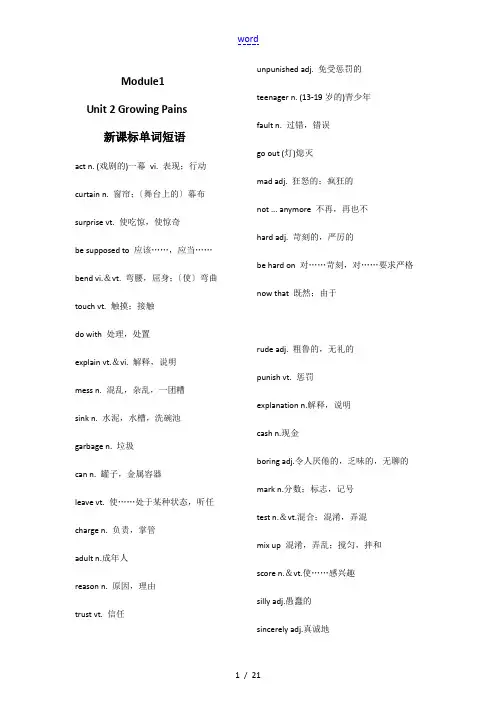
Module1Unit 2 Growing Pains新课标单词短语act n. (戏剧的)一幕vi. 表现;行动curtain n. 窗帘;〔舞台上的〕幕布surprise vt. 使吃惊,使惊奇be supposed to 应该……,应当……bend vi.&vt. 弯腰,屈身;〔使〕弯曲touch vt. 触摸;接触do with 处理,处置explain vt.&vi. 解释,说明mess n. 混乱,杂乱,一团糟sink n. 水泥,水槽,洗碗池garbage n. 垃圾can n. 罐子,金属容器leave vt. 使……处于某种状态,听任charge n. 负责,掌管adult n.成年人reason n. 原因,理由trust vt. 信任unpunished adj. 免受惩罚的teenager n. (13-19岁的)青少年fault n. 过错,错误go out (灯)熄灭mad adj. 狂怒的;疯狂的not ... anymore 不再,再也不hard adj. 苛刻的,严厉的be hard on 对……苛刻,对……要求严格now that 既然;由于rude adj. 粗鲁的,无礼的punish vt. 惩罚explanation n.解释,说明cash n.现金boring adj.令人厌倦的,乏味的,无聊的mark n.分数;标志,记号test n.&vt.混合;混淆,弄混mix up 混淆,弄乱;搅匀,拌和score n.&vt.使……感兴趣silly adj.愚蠢的sincerely adj.真诚地as though 好像,似乎insist on 坚持,坚持认为charge n. 负责,掌管adult n.成年人reason n. 原因,理由trust vt. 信任unpunished adj. 免受惩罚的teenager n. (13-19岁的)青少年fault n. 过错,错误go out (灯)熄灭mad adj. 狂怒的;疯狂的not ... anymore 不再,再也不hard adj. 苛刻的,严厉的be hard on 对……苛刻,对……要求严格now that 既然;由于cafe n.咖啡馆,小餐馆Internet cafe 网吧chat vt.&n.聊天,闲谈valuable adj.时间段,时期,阶段at present 目前,当前argument n.争论,辨论;论点,论据freedom n.自由relationship n.关系mainly adv.主要地;大体上suggest vt.建议;暗示,使想起fight vi.争吵,争论;打架,争斗crazy adj.发疯的,疯狂的like crazy 发疯似地,拼命地spare adj.空闲的;多余的selfish adj.自私的unloving adj.缺乏爱心的forbid vt.禁止Truly adv.真诚地;真实地课文出现短语1. turn up2. a waste of time3. try to do sth4. force sb to do sth5. spend time (in) doing sth6. be supposed to do sth7. in charge8. shout at9. give sb a chance to do sth10. deserve to do sth11. instead of12. be hard on sb13. now that14. be rude to sb15. feel like doing sth16. be different from sth17. in the form of18. pay attention to 19. think of20. search…for21. a little bit22. be proud of23. stay up24. mix up…with25. ask for sth26. stop doing sth27. mean to do sth28. keep in mind29. tidy up30. be angry with31. clean up32. a bit of33. at all34. invite sb to do sth35be busy with sth36. used to do sth37. be used to do sth38. be .used to doing sth39. refuse to do sth40. as though41. insist on42. prevent sb from doing sth43. forbid sb from doing sth44. argue about sth with sb45. allow sb to do sth46. do with47. go out48. not…any more49. after all50. at present51. like crazy52. choose…from53. can’t wait to do sth54. go unpunished55. should have done sth56. be nervous about sth57. all the time58. get sth done59. at the moment60. miss doing sth61. advise sb to do sth62. make a bit of difference63. be fit for64. ask to do sth,65. happen to sb一.单词应用根据单词的首字母或汉语意思填写正确单词,注意形式变化。
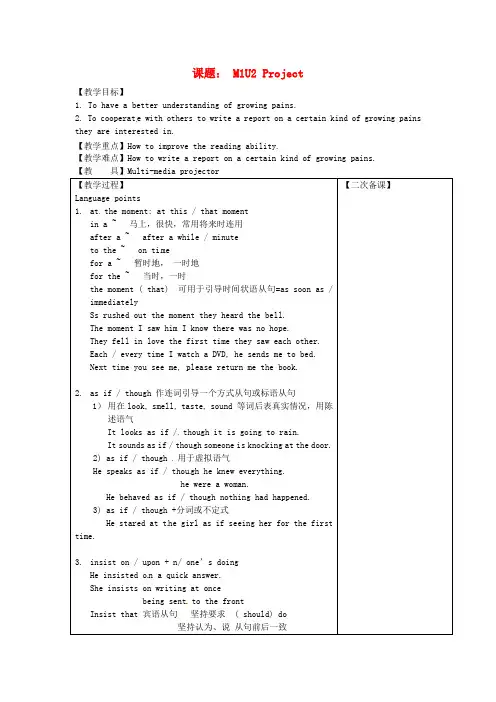
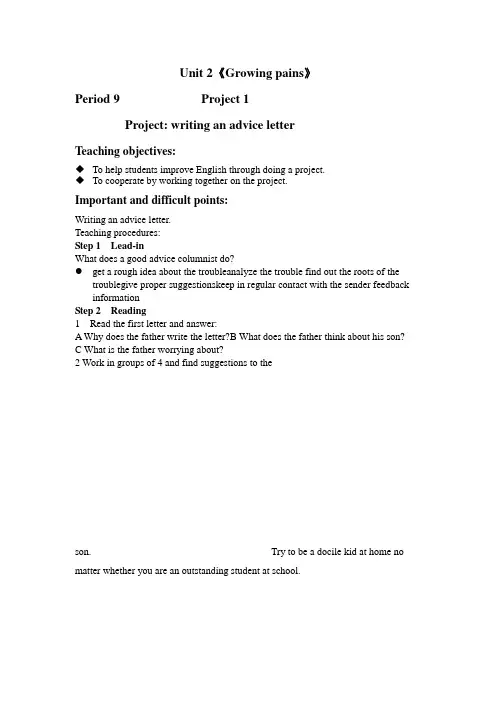
Unit 2《Growing pains》Period 9 Project 1Project: writing an advice letterTeaching objectives:◆To help students improve English through doing a project.◆To cooperate by working together on the project.Important and difficult points:Writing an advice letter.Teaching procedures:Step 1 Lead-inWhat does a good advice columnist do?●get a rough idea about the troubleanalyze the trouble find out the roots of thetroublegive proper suggestionskeep in regular contact with the sender feedback informationStep 2 Reading1 Read the first letter and answer:A Why does the father write the letter?B What does the father think about his son?C What is the father worrying about?2 Work in groups of 4 and find suggestions to theson.Try to be a docile kid at home no matter whether you are an outstanding student at school.Never attempt to change your father’s character and to be an ideal municate with your father through letters if hehappens to be e up to your dad and tell him how much you care abouthim.Remember that it’s correct f or afather to urge his son to study hard.Make your father believe you’ll be successful in life by doing what you like.Read the second letter and answer:a Why does the son write the letter?b What are his problems?c How does he feel about his father?4 Work in groups of 4 and find suggestions to the father.Try to look at things from your son’s angle. If you trade your role with your son, I believe you will realize some of the problems you mentioned in your letter are easy tosolve.Remember what your son needs ismore than material comfort.Prepare to have a heart-to-heart talk with him. M usic are part of a young people’s life. You can’t stop him just because good communication will smooth the problems. Your son wants you to treat him as your equal while you act as a commander. That’s where all theproblems come from.You’d better not put too much pressure on your son. Be a good motivator. Try to encourage him to find myself, to build up self-confidence. Cut out harsh remarks when your son falls short of your expectation.Unconditional love is very important, because he is your son.Homework:Get ready to write an advice letter.。
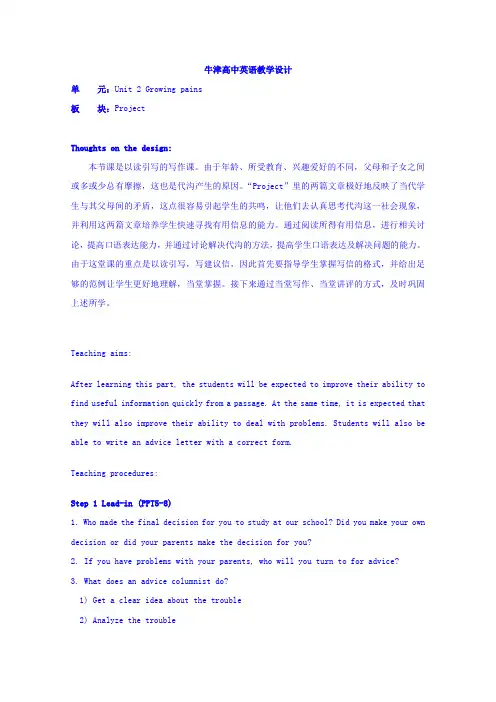
牛津高中英语教学设计单元:Unit 2 Growing pains板块:ProjectThoughts on the design:本节课是以读引写的写作课。
由于年龄、所受教育、兴趣爱好的不同,父母和子女之间或多或少总有摩擦,这也是代沟产生的原因。
“Project”里的两篇文章极好地反映了当代学生与其父母间的矛盾,这点很容易引起学生的共鸣,让他们去认真思考代沟这一社会现象,并利用这两篇文章培养学生快速寻找有用信息的能力。
通过阅读所得有用信息,进行相关讨论,提高口语表达能力,并通过讨论解决代沟的方法,提高学生口语表达及解决问题的能力。
由于这堂课的重点是以读引写,写建议信,因此首先要指导学生掌握写信的格式,并给出足够的范例让学生更好地理解,当堂掌握。
接下来通过当堂写作、当堂讲评的方式,及时巩固上述所学。
Teaching aims:After learning this part, the students will be expected to improve their ability to find useful information quickly from a passage. At the same time, it is expected that they will also improve their ability to deal with problems. Students will also be able to write an advice letter with a correct form.Teaching procedures:Step 1 Lead-in (PPT5-8)1. Who made the final decision for you to study at our school? Did you make your own decision or did your parents make the decision for you?2. If you have problems with your parents, who will you turn to for advice?3. What does an advice columnist do?1) Get a clear idea about the trouble2) Analyze the trouble3) Give proper suggestions4) Keep in touch with the sender高中择校是一个敏感问题,直接关系到以后的升学。
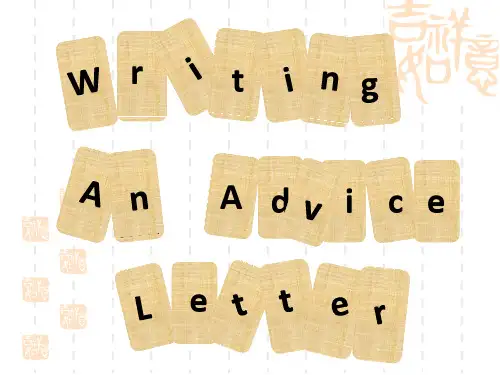
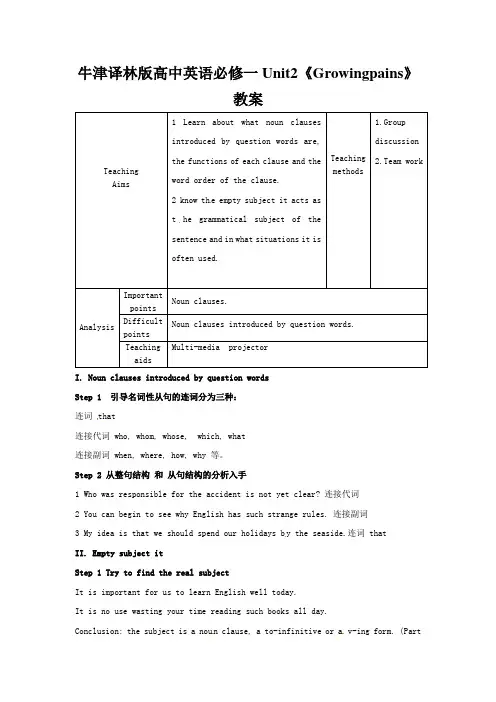
牛津译林版高中英语必修一Unit2《Growingpains》教案Teaching Aims 1 Learn about what noun clausesintroduced by question words are,the functions of each clause and theword order of the clause.2 know th e empty subject it acts ast he grammatical subject of thesentence and in what situations it isoften used.Teachingmethods1.Groupdiscussion2.Team workAnalysis ImportantpointsNoun clauses.DifficultpointsNoun clauses introduced by question words. TeachingaidsMulti-media projectorI. Noun clauses introduced by question wordsStep 1 引导名词性从句的连词分为三种:连词that连接代词 who, whom, whose, which, what连接副词 when, where, how, why 等。
Step 2 从整句结构和从句结构的分析入手1 Who was responsible for the accident is not yet clear? 连接代词2 You can begin to see why English has such strange rules. 连接副词3 My idea is that we should spend our holidays b y the seaside.连词 thatII. Empty subject itStep 1 Try to find the real subjectIt is important for us to learn English well today.It is no use wasting your time reading such books all day.Conclusion: the subject is a nou n clause, a to-infinitive or a v-ing form. (PartA on Page 31Step 2 Translation:1 要把握一门外语是困难.It is hard to master a foreign language.To master a foreign language is hard.Read Part 1 on Page 30.Step 3 Rewrite the sentencesIt seems that he speak two languages.= He seems to speak two languages.My new neighbor happens to come from my hometown.=It happens that my new neighbor come from my hometow n.Draw students’ attention to P art 2 on page 30.Step 4 how to emphasize the eleme nt in a sentence by using Empty Subject it Jane gave Mary a handbag at Christmas.It was Jane that / who gave Mary a handbag at Christmas.It was Mary that Jane gave a handbag (to) at Christmas.It was a handbag that John gav e Mary at Christmas.It was at Christmas that John gave Mary a handbag.Conclusion: It + be的一定形式+被强调部分+that /who分句形式主语和形式宾语的应用:当主语从句比较长,主句比较短时,通常用形式主语it,而把从句放在后面,如:(1)It is said that they have succeeded in working out the problem.(2)It was important that we should make the plan carefully.(3)It remains a secret how the animals came to live in the sea.当宾语从句后面有补语的时候,我们也需要用形式宾语it, 而将宾语从句放在补语之后,如:(1)I found it very difficult that one learns several languages at the same time.(2)He thinks it necessary that we should be given more time practising oral English.(3)He made it clear that he would leave the office soon.Step 5 ConsolidationGrammar1. 1. promise v. 许诺,承诺。
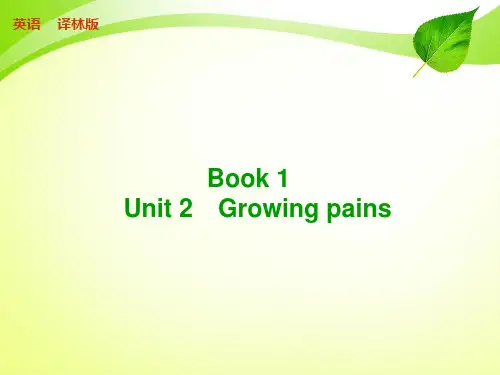

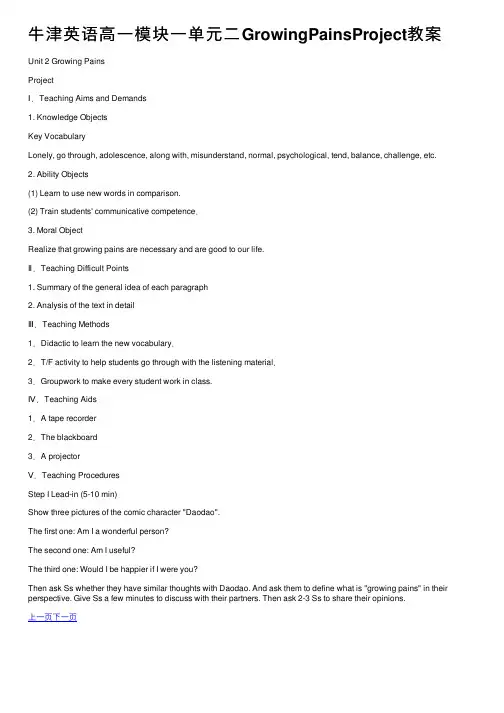
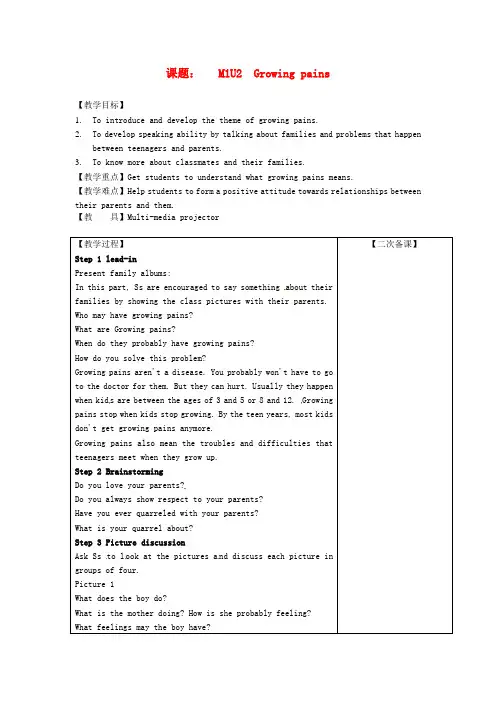
课题: M1U2 Growing pains【教学目标】1.To introduce and develop the theme of growing pains.2.To develop speaking ability by talking about families and problems that happenbetween teenagers and parents.3.To know more about classmates and their families.【教学重点】Get students to understand what growing pains means.【教学难点】Help students to form a positive attitude towards relationships between their parents and them.【教具】Multi-media projector【教学过程】【二次备课】Step 1 lead-inPresent family albums:In this part, Ss are encouraged to say something about theirfamilies by showing the class pictures with their parents.Who may have growing pains?What are Growing pains?When do they probably have growing pains?How do you solve this problem?Growing pains aren't a disease. You probably won't have to goto the doctor for them. But they can hurt. Usually they happenwhen kid s are between the ages of 3 and 5 or 8 and 12. Growingpains stop when kids stop growing. By the teen years, most kidsdon't get growing pains anymore.Growing pains also mean the troubles and difficulties thatteenagers meet when they grow up.Step 2 BrainstormingDo you love your parents?Do you always show respect to your parents?Have you ever quarreled with your parents?What is your quarrel about?Step 3 Picture discussionAsk Ss to l ook at the pictures a nd discuss each picture ingroups of four.Picture 1What does the boy do?What is the mother doing? How is she probably feeling?What feelings may the boy have?Picture 2What happens to the girl with a bag?What did her parents ask her to do?Can you guess what might have happened to her?What will she do?Picture 3Why are the boys and girls around the pretty lady?What does the boy want to do? Is he allowed to do so? Why or why not?What feelings may the boy have?Picture 4What is the boy probably doing?Did the boy do well in his exams?How does his mother feel about the score?What feelings may the boy have?Step 4 Picture descriptionImagine the situations and try to describe each picture as fully as po ssible with their own words. Make sure that Ss have “when”, “where”, “who”, “what” in your descriptions. Invite some Ss to report back their descriptions.Sharing opinions (group work)In this part, Ss discuss the following questions in groups of four. Each group chooses two of the four questions. Have Ss to report their opin ions in class.Step 4 Further DiscussionDiscuss the following questions in groups of four.What do you do when you have family arguments you’re yo ur parents?Do you think there is a generation gap between you and your parents? If s o, what is the best way to solve the problem?【教学后记】。
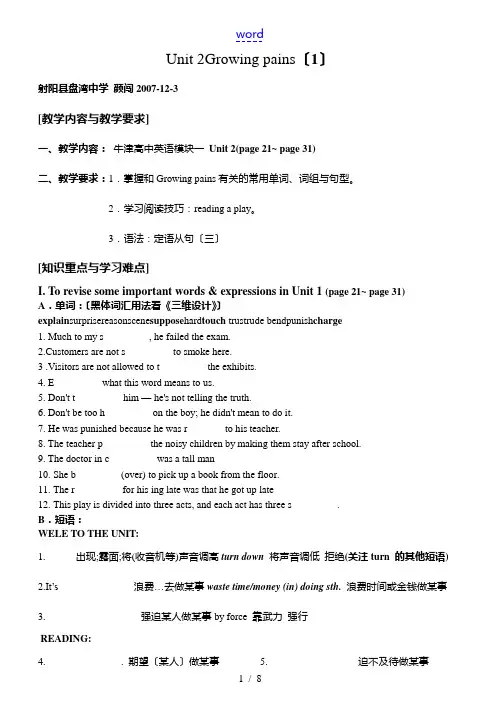
wordUnit 2Growing pains〔1〕射阳县盘湾中学颜闯2007-12-3[教学内容与教学要求]一、教学内容:牛津高中英语模块一Unit 2(page 21~ page 31)二、教学要求:1.掌握和Growing pains有关的常用单词、词组与句型。
2.学习阅读技巧:reading a play。
3.语法:定语从句〔三〕[知识重点与学习难点]I. To revise some important words & expressions in Unit 1 (page 21~ page 31)A.单词:〔黑体词汇用法看《三维设计》〕explain surprisereasonscene suppose hard touch trustrude bendpunish charge1. Much to my s_________, he failed the exam.2.Customers are not s_________ to smoke here.3 .Visitors are not allowed to t_________ the exhibits.4. E_________ what this word means to us.5. Don't t_________ him — he's not telling the truth.6. Don't be too h_________ on the boy; he didn't mean to do it.7. He was punished because he was r_______ to his teacher.8. The teacher p_________ the noisy children by making them stay after school.9. The doctor in c_________ was a tall man10. She b_________(over) to pick up a book from the floor.11. The r_________ for his ing late was that he got up late12. This play is divided into three acts, and each act has three s_________.B.短语:WELE TO THE UNIT:1.______出现;露面;将(收音机等)声音调高turn down 将声音调低拒绝(关注turn 的其他短语)2.It’s_______________浪费…去做某事waste time/money (in) doing sth.浪费时间或金钱做某事3.__________________ 强迫某人做某事by force 靠武力强行READING:4._______________. 期望〔某人〕做某事5._________________ 迫不及待做某事6._________________ 采纳某人的建议7.sb. ________________ 某人应该做某事;某人被要求,期望或认为做某事8._______ /___________ 对待处理应付9.______________________某事由某人负责10._____________________ 某任负责某事11._____________〔灯,火,蜡烛等〕熄灭12._____________使某事被做〔让人〕做某事表示主语的遭遇13._________________ 值得/应当/活该做某事14.____________ 对某人苛刻=be strict with sb15.________________________ 想要做某事16._____________________ 将A看作B /把B 当作A来看待WORD POWER:17._______…=be different in…. 在…方面不同18.______________=A be different from B A 和B不同19.___________…胜任/适合…..20.___________. 适合/胜任做某事21.____________ 保持健康22.____________将A换成B________________将A 变成B23._________________. 同某人换某物24.__________…. 要/找…..II. Sentences to be recited:1.Eric runs in after it, followed by a big dog,walking very slowly.(P22)Eric sits on his bed looking at Daniel, who has his arms crossed and looks angry.(P23)followed by a big dog / walking very slowly / looking at Daniel在句中作伴随状语。